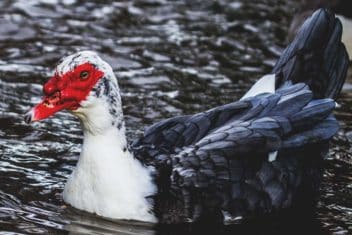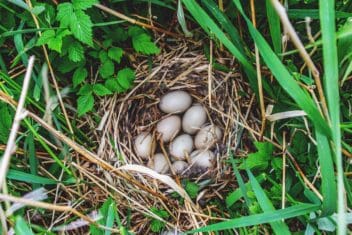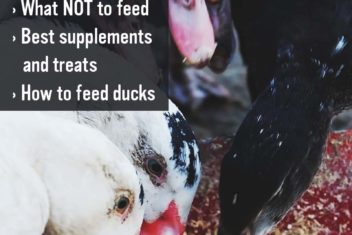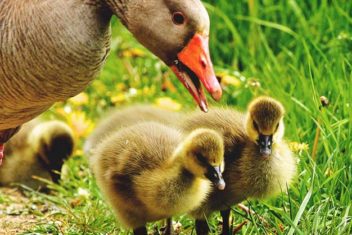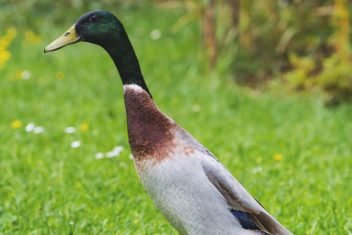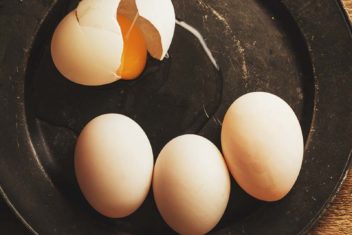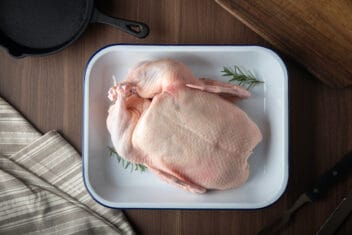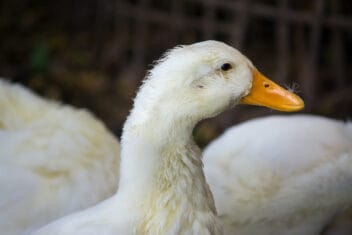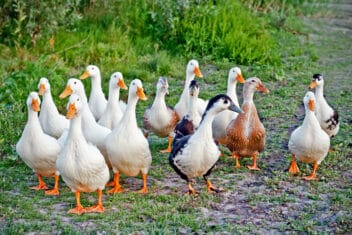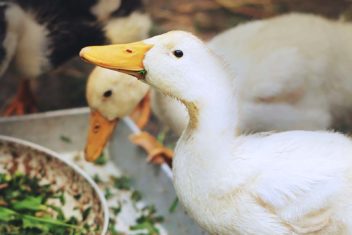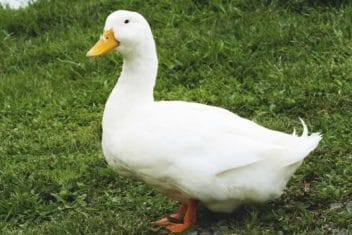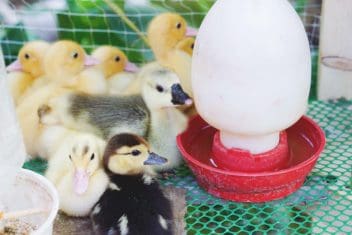Raising ducks is an amazing experience! They are cute and bring a lot of entertainment to the yard.
Plus, despite chicken’s popularity as a backyard pet, ducks are actually easier to raise than chickens because of their hardiness. They are quite similar in some ways, but there are grave differences you need to know as a future duck keeper.
Understanding ducks and their needs are something that should be understood before jumping into raising ducks.
1. Recommended Breeds
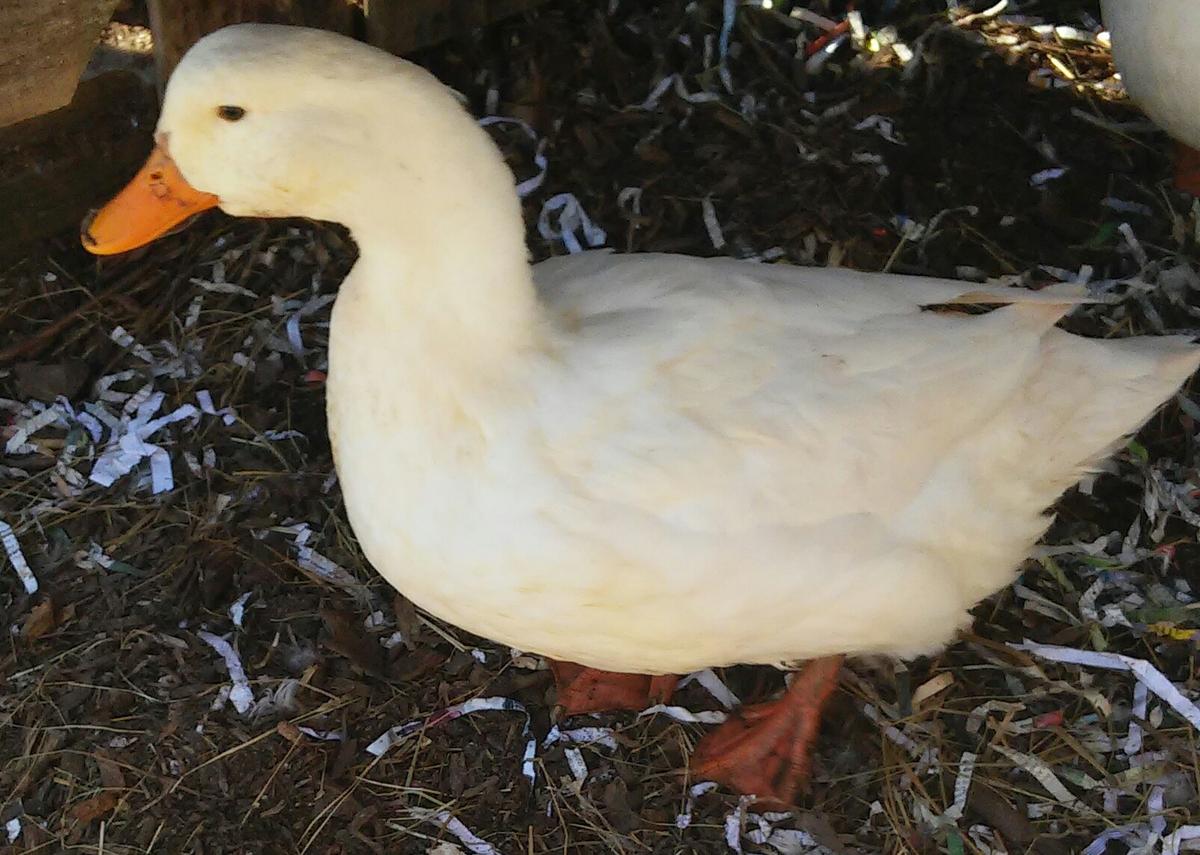
Pekin ducks always come as the most recommended breed for a backyard duck.
They are great for many reasons. First, at 10 pounds per bird they’re considered pretty large in size that they’re too heavy to fly, so you can allow them to free-range in your yard without having to worry about them trying to fly south for the winter.
Second, Pekin ducks are great foragers and are also very friendly. These are awesome traits if you don’t want to micro-manage your ducks.
Third, Pekin ducks are a great meat source (because of their size) and also excellent layers of large white eggs. You can expect Pekin hens to lay somewhere between 150-200 eggs per year.
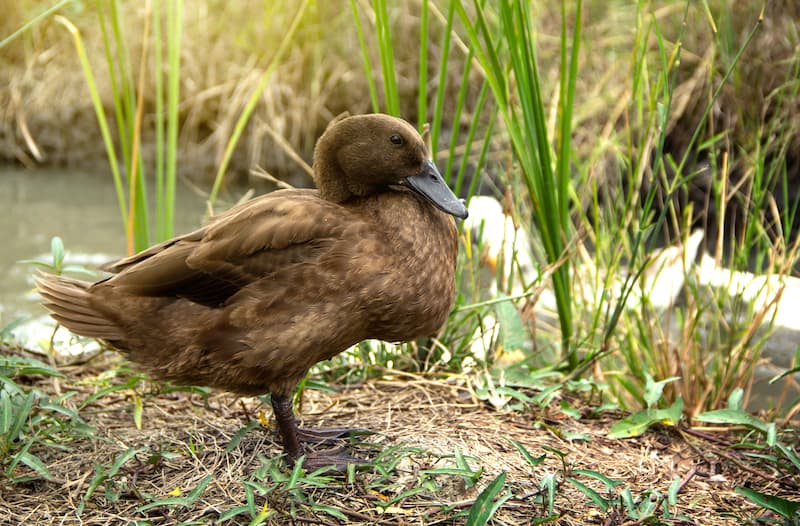
Khaki Campbells are another highly recommended duck breed. They are smaller in size (usually weighing about 3 pounds or so) but still have limited flight capability, which is important because otherwise it is difficult to keep them home.
Khaki Campbell ducks lay more eggs than Pekin ducks at 280-300 eggs per year, but you’ll get less meat from them. So if you prefer eggs than meat, you might want to choose Khaki Campbells instead and vice versa.
Just like Pekin, Khaki Campbells are excellent foragers and friendly towards other ducks and humans. Though they can be more energetic at times, so you’ll need to provide a bigger space for them.
Don’t dismiss other breeds just yet. There are other duck breeds that are just as good or better at egg/meat productions. Learn more about other popular breeds here.
2. Proper Protection
Though not as bad as chickens, ducks are still highly preyed upon. If you have a dog, you might have to keep the ducks away from it unless it’s one of the dog breeds that can’t run very fast or older dogs who just don’t have the energy to chase down a duck.
If you have cats, you have to be even more careful because it’s hard to train cats not to hunt birds.
Here’s the list of some of the most common duck predators:
Keeping ducks fenced is a wise option to protect them from most predators.
If you have a hawks problem, place a taller fence. Birds like hawk have a hard time pulling an animal away from a tall fenced area because they can’t fly up and down vertically like a helicopter.
If you have problems with animals that can dig their way in, make sure you use hard material for flooring.
Here’s the more complete guide about poultry predators.
3. Housing for Ducks
Ducks do not require nor do they desire a fancy house.
As a matter of fact, the more run down the house is, the happier they seem to be. Ducks love to be wet and they are covered in waterproof feathers. Giving them a home where they can keep some moisture (not too much) and have lots of airflows seems to be what keeps them happy.
The most important thing to have in your duck coop is comfortable bedding made of straws or pine shavings.
Nesting boxes are optional because your ducks might prefer making their own nesting area inside or outside the coop.
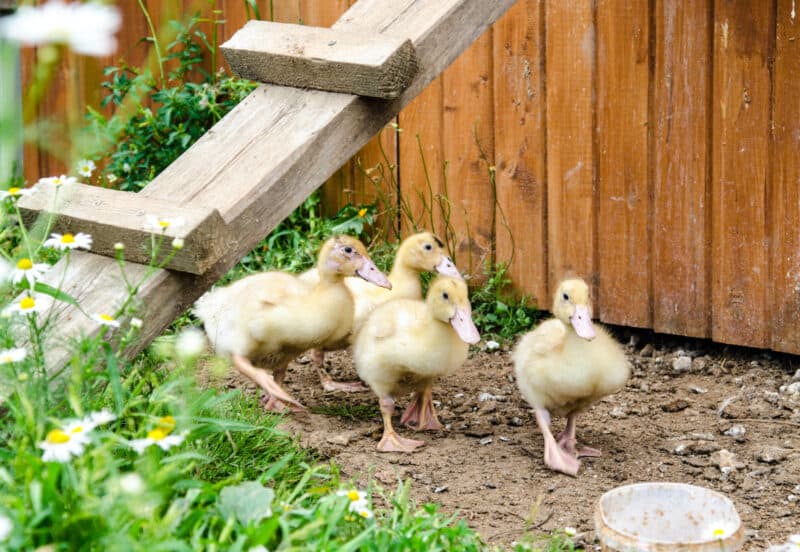
Make sure that their housing is elevated from the ground to keep it dry but still low enough that a duck can enter it with a small ramp. If you make the duck house too high, the ducks will be afraid to step on it.
If you want to try DIY-ing a duck coop, read up on further duck coop considerations before selecting one of these free duck house plans.
4. Laying Habits of Ducks
Ducks are not like chickens when it comes to laying habits.
Chickens decrease laying when the days become shorter, but they still lay sporadically. Ducks do not. They take a total hiatus every year during winter.
Most years, they will quit at mid to late fall and reconvene at the onset of spring.
Though ducks don’t lay all year long and they lay less frequent than most egg-laying chicken breeds, they lay much larger eggs and are much hardier birds than chickens. Here’s an article where you can learn about the characteristics of duck eggs and how it compares to other poultry.
Ducks are earlier risers than chickens. During their laying time, she will have already laid an egg before your feet even have hit the floor. If you’re a morning person, you’ll love your ducks because of it.
Read this article to learn more about duck’s nesting and laying habits.
5. Ducks Love Water (but they don’t need a whole dam of it)
People that have never raised ducks might assume that they need a body of water in order to have them. This is not the case.
Ducks do not require water besides for drinking purposes.
For that, you just need to fill up a 5-gallon bucket of freshwater every day, and they will be very happy.
Water for swimming isn’t a requirement, but they do love water. If you live on a property without a source of swimming water, investing in a kiddie pool is a good idea to keep them happy.
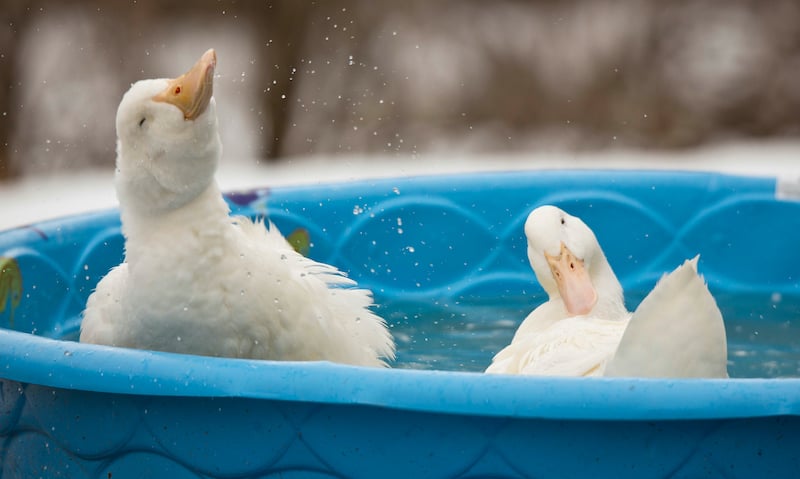
Ducks will only swim in clean water, they won’t swim when the pool water gets too colored. For a small kiddie pool, you need to change it daily, and every 4-7 days if you have a larger kiddie pool.
6. Food for Ducks
Feeding ducks is not complicated.
Ducklings need waterfowl starters with 18-22% protein content. Juvenile ducks (2 months old) need duck feed with at least 15% protein content. Adult laying ducks need duck feed with 16-17% protein content. Broiler ducks need duck feed with at least 20% protein content.
See, It’s not hard. Though we do have a guide if you want to learn more about feeding ducks. If you’re a perfectionist, here’s the most detailed guide about ducks protein requirement.
The more important thing is how you provide their food.
Always, always keep their food and water separate. They love to play in the water, and they love to eat. So, of course, they are going to try and mix the two.
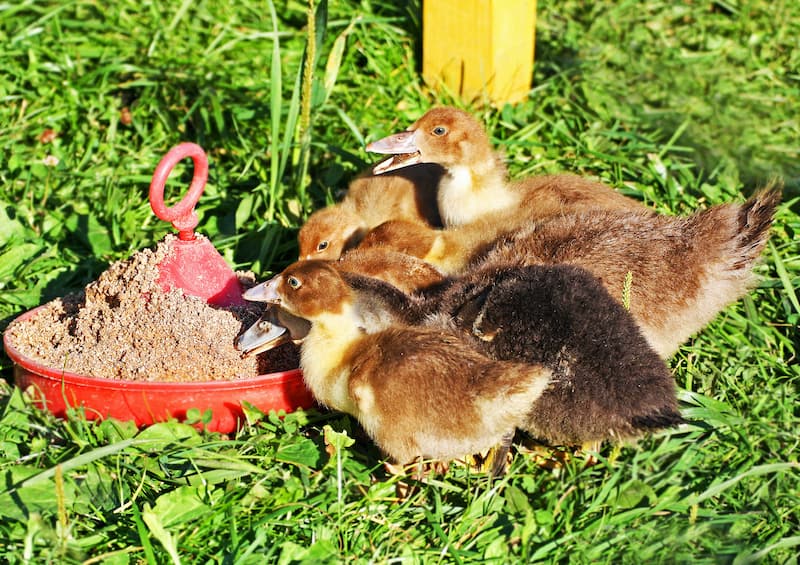
The best method of feeding ducks is the full-feeding method. Just fill a feeder and leave it available for them all day. They will eat when they need it.
Ducks forage, so they will eat weeds, plants, and bugs, which means they will eat less feed from the feeder if you free-range them. Great way to save some money.
Another way to save money on duck feed is to grow fodder. Here is how you can grow fodder systems to feed them inexpensively.
7. Ducks are Great Garden Guards
Ducks are a gardener’s best friend.
They are great at pulling bugs off of your garden plants without harming the actual plant (they’re even better than chickens!).
Plus, their poop makes good fertilizer.
The only word of caution is to be sure not to allow your ducks in your garden until the plants have passed the seedling stage. Ducks have a tendency to step on small plants and kill them.
8. Raising Ducks for Meat
Ducks are great as a source of meat, especially Pekin ducks. They can grow to be 10+ pounds in a matter of 3-4 months. It does not take long to have a viable meat source from ducks if that’s what you’re looking for.
However, you must know that it will probably not save you money compared to buying duck meat from the grocery store. In fact, in some cases, raising ducks for meat costs more money unless you have commercial-level management and not planning to sell some of the surplus meat.
But that doesn’t mean it’s not worth it at all.
Raising ducks for meat means having a good quality food source in your backyard. You can rely less on grocery stores and become more self-sustainable. Plus, you can learn a lot from the process in case you want to sell the meat in the future.
9. The Difference in Gender
Having two males in a small flock is not productive. It is important to know the difference in characteristics of ducks, so you don’t end up with more than one male.
You do not sex a duck the way you would most animals because female ducks look a lot like male ducks in most breeds. The difference is her quack sounds more like a honk. She is the louder of the two, hands down.
It’s subtle but male ducks have a little tail feather that curls at the tip of his tail. He will usually follow behind her and be the quieter of the two. When he wants to lead her, you will see him bob his head up and down to communicate and quack softly at her to get her to go where he wants her to.
If you are getting too close to his hen and her eggs the male duck will guard her. He won’t flog as a roost would. Instead, he will start off by bobbing his head (as though to nudge you) to get you to move away from her.
If you don’t take the hint is when he will get angry. The female will hiss and let you know you need to back off.
10. Mating
Male ducks (a drake) usually require more than one female. They have an extremely high sex drive and can literally breed a female duck to death. One drake can handle up to 12 (!) female duck.
Also, the way they mate is…astonishing. It’ll look like he’s trying to killer, but don’t panic, he’s not.
It gets more extreme. If the couple is mating in the pool, you will see him push her head underwater like he’s trying to drown her. Again, don’t panic, it’s normal.
The only time you need to worry is when she’s honking really loudly. That means she doesn’t appreciate it or needs your help. If you don’t hear her honking, let them be.
11. Keeping Ducks with Chickens
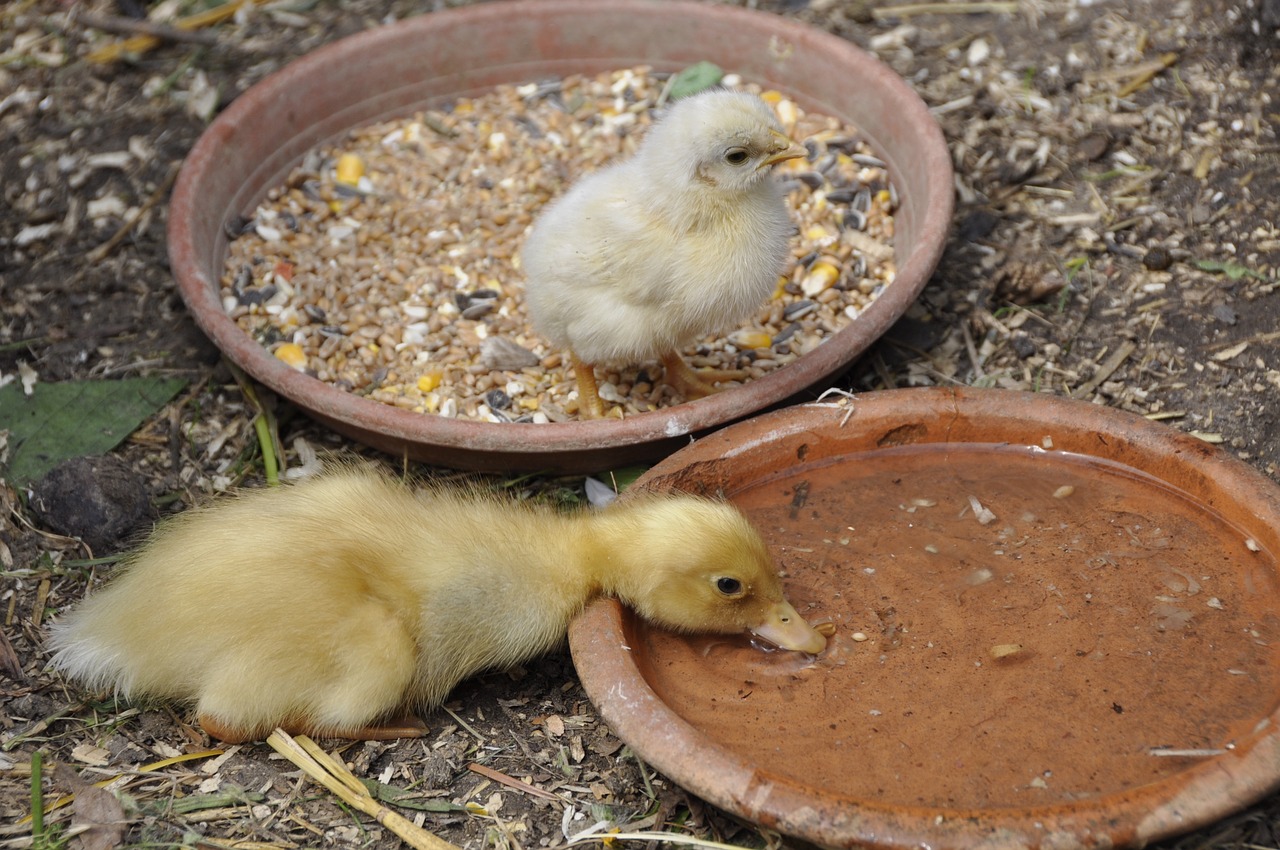
Some people raise their ducks with chickens, and some people against it.
Ducks and chickens can coexist just fine. Even the meanest of roosters can get along with a drake. The only risk to raising chickens and ducks together is that a rooster will try to mate a duck hen, and a drake will also try to mate a chicken hen.
A rooster mating a duck hen, that’s not a big deal. However, things get a little complicated when a drake is trying to mate a chicken hen.
You see, unlike a drake, a rooster does not have an appendage that protrudes from his body during mating. This is an issue because chicken hens are not equipped to handle that. They can get seriously hurt or even die.
If you still want to raise chickens and ducks together, make sure you have at least three female ducks per drake so he won’t try to mate a hen. Or, don’t keep any drake at all.
12. Unlike Chickens, Ducks are Really Hardy Birds
Chickens are prone to viral respiratory infections, ducks are not. This is why you don’t need to give ducklings medicated starter feed.
They are also not sensitive to the cold as much as chickens. You can even find your ducks hanging around outside the coop with snow on the ground or even during a rainstorm.
If you’re a beginner farmer, ducks are awesome and fun animals to raise because of their hardiness.

